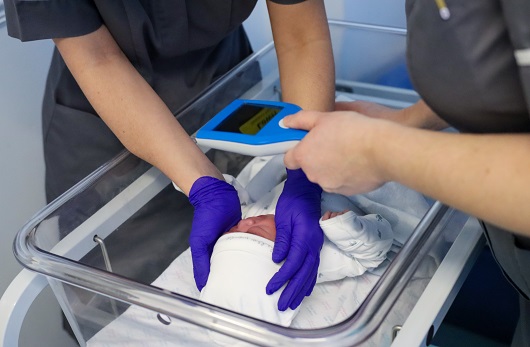Media Release
Date: 28 January 2025
RUH researchers set their sights on study success
The maternity and paediatric research teams at the Royal United Hospitals Bath NHS Foundation Trust are celebrating recruiting their 1,000th young participant to a major study which uses an infra-red camera to screen for congenital cataracts in newborn babies.

The latest participant to join the study is the son of Corsham couple Milan and Binod Gurung.
Mum Milan said: “It’s really exciting that he’s the 1,000th baby to take part in the research. It’s the first time that I’ve been involved in a research study, but it’s been really easy to take part and I’d be happy to do it again. It’s a really important study and helpful for him and us as his parents.”
Ros Knight, Paediatric Research Nurse, said: “We’re delighted to have reached such a major milestone in our recruitment to this study. Cataracts don’t only affect older people and are the most common cause of avoidable child blindness in the world.
“Improved cataract detection, resulting in earlier surgery, could reduce the risk of life-long visual impairment in babies born with a cataract.”
Funded by the National Institute for Health and Care Research (NIHR), the DIvO (Digital Imaging versus Ophthalmoscopy) study is a two-year UK clinical study which aims to find out if digital imaging is a more accurate method of detecting cataracts in newborn babies than the current technique using an ophthalmoscope (a medical eye torch).
Each baby taking part in the study will have both the normal ophthalmoscopy test and imaging with the Neocam device to compare the two methods. The process is quick and painless.
The study is particularly important for babies with darker skin tones as the current method for detecting cataracts is less accurate in eyes with more pigmentation. Earlier studies have shown that the new test may work better.
The RUH is one of a number of sites supporting the DIvO study. Parents may be asked to help with the study after the birth of a child, but taking part is optional.
Find out more about the DIvO study: https://divostudy.org/
ENDS

